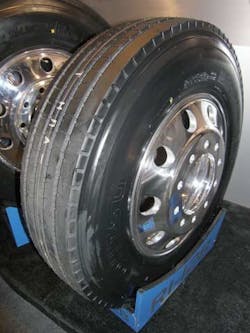Back in the game
Falken Tire Corp. will return to the medium truck tire market next month when it takes over distribution of the Ohtsu truck tire brand in North America. The Fontana, Calif.-based company will assume control of Ohtsu from Itochu International on March 1.
This marks the second time Falken has enjoyed exclusive distribution rights to Ohtsu.
The Sumitomo Rubber Industries Ltd. (SRI) subsidiary distributed the brand until early 2005, when SRI transferred control to Itochu, a company with which it is closely affiliated. The switch back to
Falken is happening at the perfect time, despite the depressed state of the medium truck tire market, says Falken President and COO Richard Smallwood.
“I’d rather get in when the market’s in a horrible situation because it lets me look at things in the worst case scenario. In this kind of situation, you can’t be sloppy. You have to have your game down very well.”
Falken will initially offer 14 already-existing Ohtsu tread designs.
“We’re not adding anything new until July, when we’re targeted to launch a SmartWay-approved product.”
The new tire will bear the Falken name instead of Ohtsu — a sign of things to come, according to Smallwood. “We will gravitate toward everything being Falken brand” eventually, he says.
Ohtsu truck tires are only sold in the U.S. “It’s Falken everywhere else in the world. From a global branding standpoint, it doesn’t make sense to have Ohtsu only for the U.S. And it doesn’t make sense from a manufacturing and development standpoint.”
[PAGEBREAK]The name change “will make it easier for us to get more development and production.”
Falken Tire also will dramatically change Ohtsu’s distribution model. Ohtsu currently is a container-only program. By June, the product will be available through all four of Falken’s U.S. distribution centers: Dayton, N.J.; Juliet, Tenn.; Irving, Texas; and Fontana.
“If the dealer buys product — if they’re buying light truck or high performance tires — they can put 20 medium truck tires on the load instead of waiting 90 or 120 days to get their order in.”
Currently, there are about 20 “good-size” dealers in the U.S. who carry Ohtsu truck tires, says Smallwood. The largest is Bend, Ore.-based Les Schwab Tire Centers, which has more than 420 commercial/retail tire outlets.
“Our first priority is to grow the existing dealers we have. Our goal is to make sure we know who our best partners are. Then where we have holes in distribution, we’ll find new dealers.” The southwestern U.S. will be a target area.
“We have a volume target that we know we can reach and still offer very clean territories for people.
We want to minimize dealer conflict as much as possible.”
Furthering the Ohtsu program will be a “walk-before-we-run process,” he continues. Fleet testing is at the top of the priority list.
“We want to establish the credibility of the product. Next, we’ll increase our technical group — the total number of people we have available to support the program.” (SRI designs and manufactures Ohtsu truck tires in Japan.)
“Then we’ll establish a solid medium truck tire sales program. We’re going to take more of an approach that a Toyo, Hankook or Kumho might.
[PAGEBREAK]“We did a very comprehensive study, and if you look at The Big Three and then Continental Tire North America Inc. and Yokohama Tire Corp., they have large commercial truck tire sales departments.
“It would be very difficult — almost impossible — to compete against those larger companies when you don’t have that kind of sales support. We know there’s a certain volume level that’s available to us. Our goal is to be at the lower level of the second tier. SRI has enormous resources, which makes it easier. So we basically get to start from scratch.” ■
How to build a truck tire program: Falken will follow four points
“There are four key points we’re looking at” in the development of the Ohtsu medium truck tire program, says Falken Tire Corp. President Richard Smallwood:
1. Quality. “We have to demonstrate that we have superior quality and a cost-per-mile advantage.”
2. Convenience. “We want to make it very easy for dealers and fleets to get product. We’ll have five warehouses by the end of 2011.”
3. Profitability. “We want to make sure the dealer has higher-than-average profitability with our brand.”
4. Fairness, which means “offering flexibility in our adjustment policy and the resolution of any kind of issue.”
“The decision to bring Ohtsu back to Falken was to help us have a full product line-up for our dealers.”
